Top 9 Places to Experience Kyoto's Traditional Crafts
As you plan your Kyoto itinerary, consider immersing yourself in the city's revered artistry by exploring its top 9 places for traditional crafts. Engage with master craftsmen at Nishijin Textile Center, where you'll come face-to-face with the ancient art of silk weaving. At Kiyomizu Pottery Studios, you can shape clay into beautiful pottery pieces under expert guidance. Each location offers a unique glimpse into the cultural heritage of Kyoto, from the delicate Fushimi dolls to the serene Uji tea ceremony. Discover which spots can't be missed and why each provides a profound insight into the craftsmanship that shapes Kyoto's identity.
Nishijin Textile Center
At the Nishijin Textile Center, you can witness the intricate weaving process of Nishijin-ori fabrics, renowned for their quality and beauty. As you explore the center, you'll see skilled artisans at work, transforming silk threads into exquisite textiles known for their elaborate designs and vibrant colors. These fabrics are a key part of Kyoto's cultural heritage, often used in the making of kimonos and other traditional garments.
During your visit, you'll also have the opportunity to try your hand at weaving under the guidance of these master weavers. It's a unique chance to engage directly with this ancient craft, allowing you to appreciate the skill and patience required to produce each piece.
Don't miss the fashion shows held at the center, where you can see modern and traditional garments made from Nishijin-ori fabrics. These events demonstrate the versatility of the textiles and how they've adapted to contemporary fashion trends while maintaining their historic significance.
Before leaving, you might want to stop by the gift shop. It's filled with items made from Nishijin-ori, offering a tangible piece of Kyoto's artisanal legacy to take home with you.
Kyoto Handicraft Center
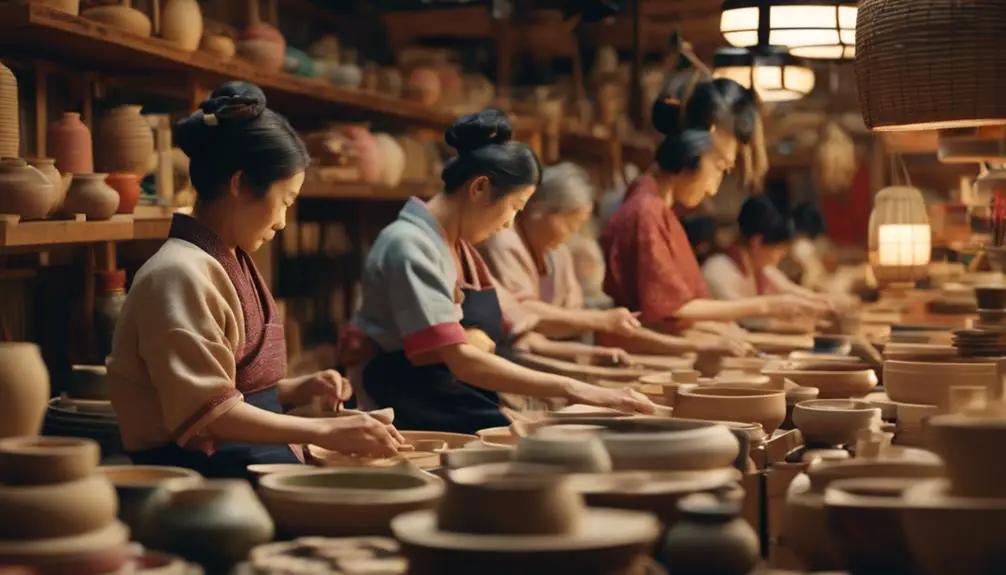
Continuing your exploration of Kyoto's artisanal offerings, the Kyoto Handicraft Center presents another enriching opportunity to immerse yourself in local craft traditions. Here, you'll not only observe the intricate processes of craft making but also participate in them. The center offers a plethora of workshops where you can try your hand at creating traditional Japanese arts under the guidance of skilled artisans.
From painting your own delicate designs on fans to shaping and coloring your own pottery (without delving deeply into the specifics of Kiyomizu pottery), the experience is both educational and deeply personal. You're not just watching; you're actively preserving ancient techniques through your own creations.
The Kyoto Handicraft Center is well-equipped to cater to both beginners and those with more advanced skills, ensuring a rewarding experience regardless of your starting point. Here are a few highlights:
- Workshops: Engage in sessions where you can create your own Japanese crafts, from fans to clay works.
- Artisan Demonstrations: Watch master craftsmen at work, gaining insight into the years of practice behind their skills.
- Gift Shop: Take home a piece of Kyoto with crafts made by local artisans, perfect for souvenirs or gifts.
This center isn't just a stop on your tour; it's a thorough exploration into the heart of Kyoto's craft culture.
Kiyomizu Pottery Studios
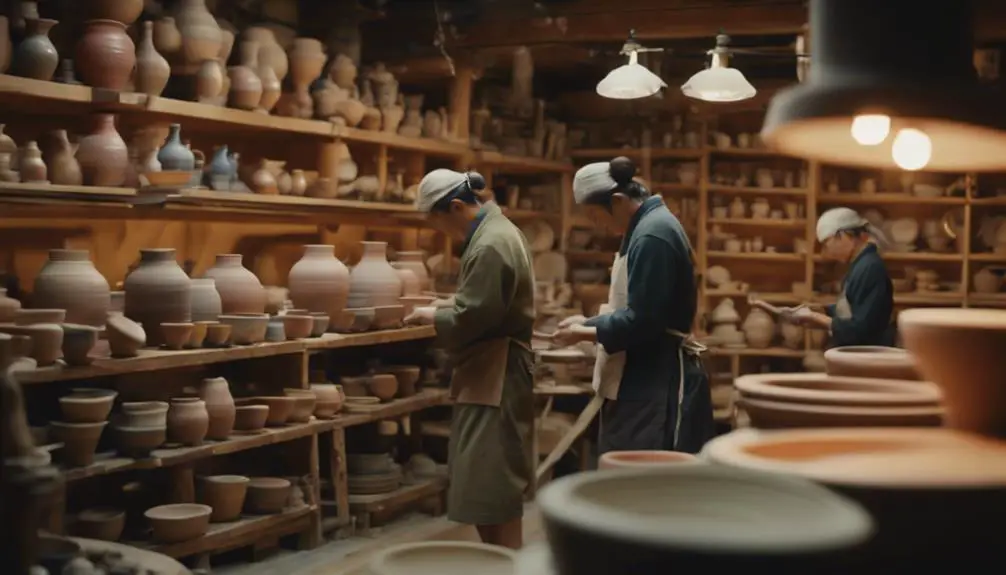
Explore the renowned Kiyomizu Pottery Studios where you can immerse yourself in the world of traditional pottery-making. Nestled in the charming slopes near Kiyomizu Temple, these studios offer a unique glimpse into the centuries-old art form, famed for its intricate designs and vibrant glazes. You'll discover that each piece of Kiyomizu ware is handcrafted with skills passed down through generations.
As you wander through the workshops, you'll see artisans at work, their hands shaping the soft clay into beautiful bowls, cups, and vases. Don't miss the chance to try your hand at the potter's wheel. Many studios offer short courses or workshops where you're guided by skilled potters to create your own piece. It's not only a fun activity but also a profound way to connect with Kyoto's cultural heritage.
The pottery here is characterized by its elegance and durability, with patterns that often reflect natural motifs and the seasons. Before you leave, stop by one of the studio shops. You'll find exquisite pottery pieces, perfect for souvenirs or gifts, that embody the spirit of Kyoto. Visiting Kiyomizu Pottery Studios isn't just about observing; it's about participating in a living tradition.
Kyoto Artisans Concierge
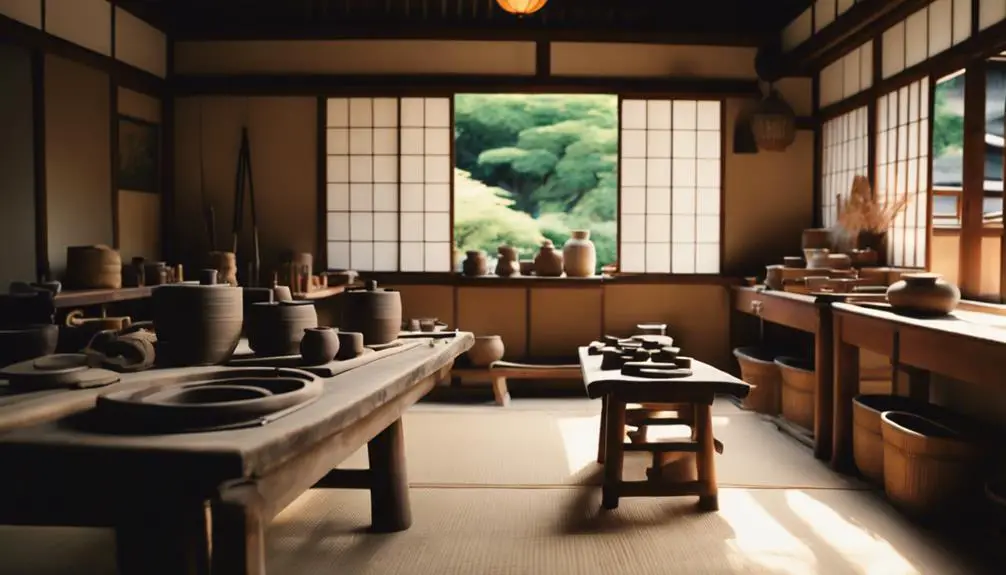
If you're keen on delving deeper into Kyoto's traditional crafts, the Kyoto Artisans Concierge is an invaluable resource that connects visitors with skilled local craftsmen. This unique service offers you a direct line to the heart of Kyoto's craft culture, allowing you to interact one-on-one with artisans. Whether you're a curious traveler or a dedicated art enthusiast, this experience is tailored to deepen your understanding and appreciation of traditional techniques passed down through generations.
The Kyoto Artisans Concierge isn't just about watching; it's about participating and learning. You'll have the chance to engage directly with the artisans, who are enthusiastic to share their knowledge and passion. Through these interactions, you'll gain insights that are rarely accessible to the general public.
Here are some unique experiences you can expect:
- Personalized Workshops: Engage in workshops where you can learn and practice crafts under the guidance of master artisans.
- Artisan Studio Tours: Get exclusive tours of working studios, witnessing the creation process first-hand.
- Cultural Insights: Gain deeper understanding of the historical and cultural significance of various crafts, enriching your overall experience.
Don't miss this opportunity to connect intimately with Kyoto's living art history.
Fushimi Doll Workshops

For an immersive experience in Kyoto's cultural heritage, consider participating in a Fushimi Doll Workshop. Nestled in the charming district of Fushimi, these workshops allow you to explore the intricate world of traditional Japanese doll-making, an art form cherished for its detailed craftsmanship and cultural significance.
You'll find yourself surrounded by master artisans who've honed their skills over decades. They'll guide you through the process of creating your own Fushimi doll, from sculpting delicate features to painting vibrant kimonos. The materials used are of the highest quality, ensuring your creation is both authentic and enduring.
As you shape the clay and select fabrics, you'll learn about the history and symbolism behind these dolls. Each one tells a story, reflecting aspects of Japanese folklore and the seasonal celebrations of Kyoto. It's not just a craft session; it's a cultural dialogue, enriching your understanding of Japanese traditions.
The workshops are typically small, offering a personal and engaging experience. You don't need any prior craft skills—just a curiosity about Japanese culture and a willingness to learn. By the end of the workshop, you'll haven't only a unique souvenir but also a deeper appreciation for Kyoto's artistic heritage.
Uji Tea Ceremony Experience
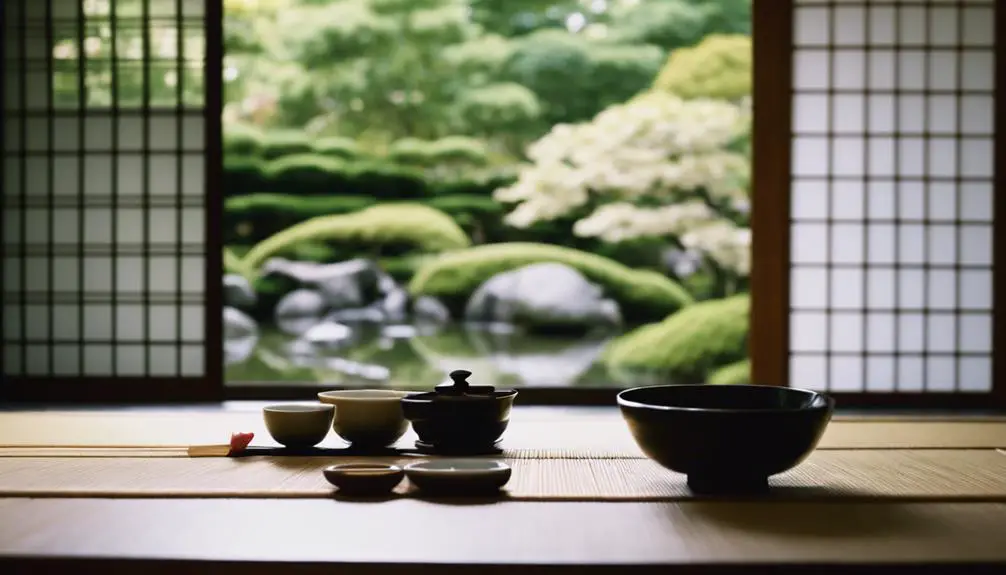
Experiencing a traditional Uji Tea Ceremony offers a profound insight into the ceremonial heart of Japanese culture. As you sit on tatami mats in a serene tea house, you'll feel the history and meticulous care woven into each gesture and utensil. This isn't just about drinking tea; it's a meditative practice that cultivates peace and mindfulness.
Here's what you'll discover during your Uji Tea Ceremony:
- Historic Significance: Uji, renowned for producing the finest matcha, has been pivotal in the development of tea culture in Japan. This city's tea has been esteemed since the Heian period, making it an authentic experience.
- Masterful Techniques: Watch as the tea master performs the art of 'temae', which is the meticulous preparation and serving of matcha. Each movement is precise and purposeful, reflecting years of mastery.
- Interactive Learning: You'll get the chance to whisk your own matcha under expert guidance. This hands-on approach demystifies the process, allowing you to appreciate the texture and flavor nuances of freshly prepared matcha.
Gion Tatsumi Bridge Area
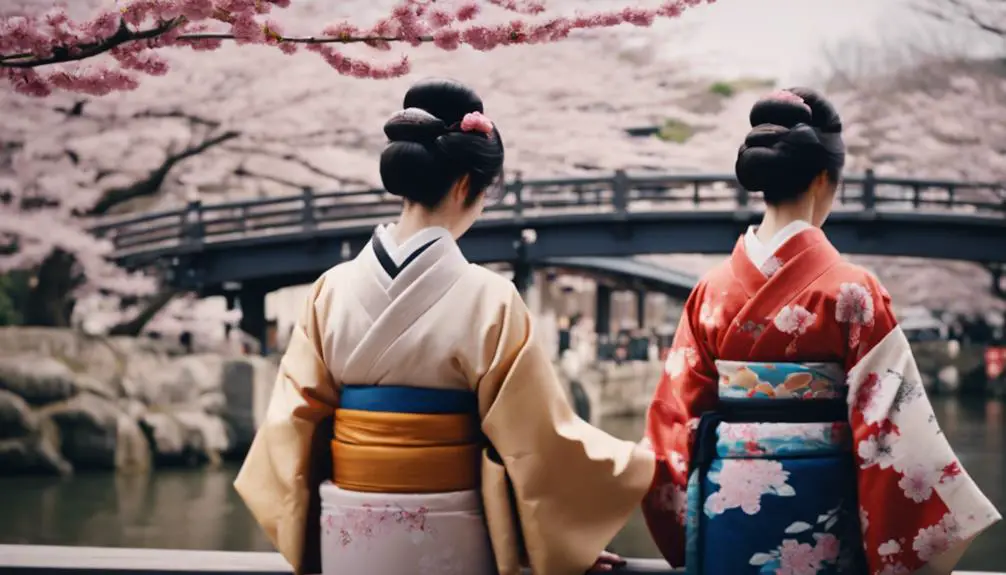
Strolling through the Gion Tatsumi Bridge area, you'll step into a picturesque scene that captures the essence of old Kyoto. This iconic locale isn't just famed for its historic charm but also as a vibrant hub where traditional crafts thrive.
As you wander, you'll notice the subtle yet profound craftsmanship displayed in the local shops, each offering unique, handmade items ranging from delicate fabrics to intricate ceramic wares.
You'll find yourself mesmerized by artisans who practice age-old techniques with a level of dedication that seems almost meditative. Watch a master potter at his wheel, his hands shaping clay with precision that's been perfected over decades.
Nearby, a textile artist dyes fabrics using methods that have been passed down through generations, creating patterns that tell stories of Kyoto's cultural heritage.
Don't miss the chance to try your hand at some of these crafts. Many workshops are available where you can learn the basics of pottery, textile dyeing, or even the meticulous art of fan painting. It's not just a way to take a piece of Kyoto home with you; it's an opportunity to connect deeply with the traditions that have shaped this enchanting city.
Arashiyama Bamboo Craft Tours
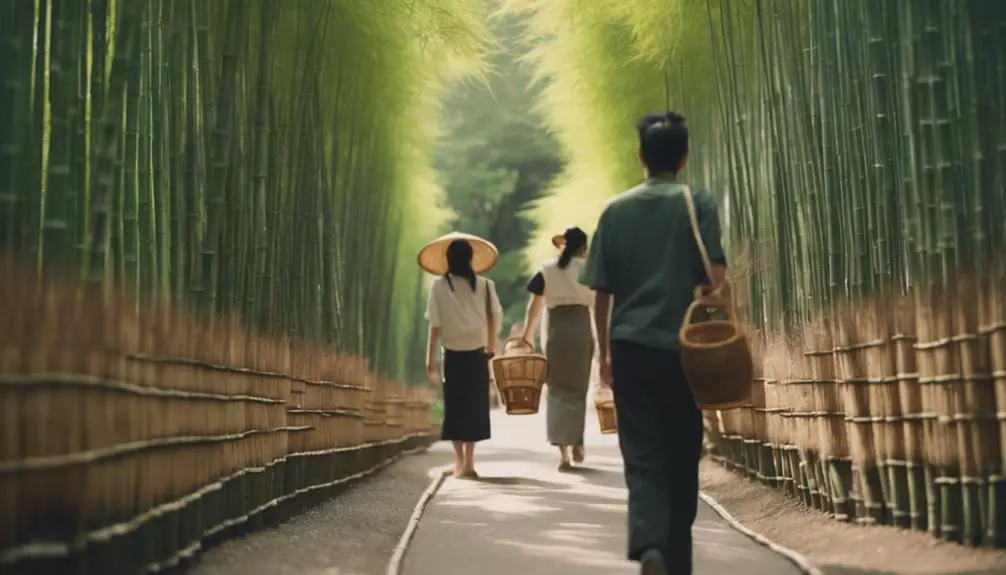
After exploring the Gion Tatsumi Bridge area, head to Arashiyama to discover the unique world of bamboo craft tours. This serene district, known for its breathtaking bamboo groves, offers more than just picturesque scenery. It's also a hub for traditional bamboo crafts, deeply rooted in Japanese culture and history.
You'll find a variety of workshops where you can watch artisans at work, transforming bamboo into intricate pieces of art and practical items. These tours not only allow you to observe but also to participate. You can try your hand at making your own bamboo crafts under the guidance of skilled craftsmen. It's a hands-on experience that connects you with the age-old techniques passed down through generations.
Here's what you can expect on a bamboo craft tour:
- Live Demonstrations: Witness the precision and skill as artisans create bamboo products from scratch.
- Interactive Workshops: Engage in a workshop to learn and create your own bamboo souvenir.
- Cultural Insights: Gain insight into the significance of bamboo in Japanese culture and its uses in daily life.
This unique experience will give you a deeper appreciation for this sustainable resource and its role in Japanese craftsmanship.
Don't miss this intimate look into Kyoto's traditional arts.
Toji Flea Market Crafts

Explore the Toji Flea Market to uncover a treasure trove of local crafts. Held on the 21st of each month beside the historic Toji Temple, this market is a vibrant hub where Kyoto's traditional artisans showcase their skills.
You'll find stalls brimming with handmade ceramics, delicate fabrics, and intricate woodwork, each piece telling a story of age-old techniques passed down through generations.
As you wander through the rows of colorful displays, you might stumble upon a craftsman carving tiny figures from wood or a weaver demonstrating the art of creating kimonos. Don't hesitate to engage with them; they're usually enthusiastic to share insights into their craft and the history behind their art.
Be sure to check out the pottery stalls, where the unique Kyo-yaki and Kiyomizu-yaki ceramics are featured. These styles are renowned for their intricate designs and vibrant colors, making them perfect souvenirs that capture the essence of Kyoto.
Wrapping up your visit, you can't miss the food vendors. The local snacks are a delightful treat after a day of craft exploration. From savory street food to sweet treats, they'll provide the perfect end to your immersive cultural journey at the Toji Flea Market.
